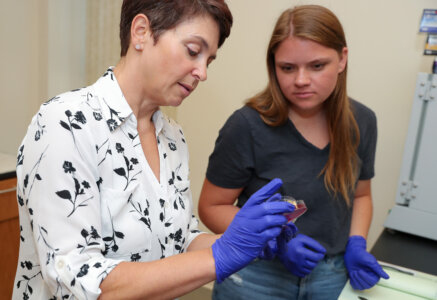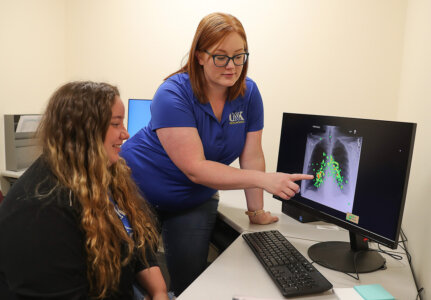
By TYLER ELLYSON
UNK Communications
KEARNEY – University of Nebraska at Kearney senior Johanna McClure has her sights set on a career in neuropsychology, a field that examines how the brain and central nervous system affect cognitive and behavioral functions.
The North Platte native knows she’ll need to attend graduate school to get there, so she’s taking advantage of every opportunity to prepare for that process.
Last fall, McClure started working with assistant psychology professor Katherine Moen, who researches areas such as memory and attention. As a work-study research assistant, McClure helped program experiments, collect data and operate the eye-tracking system installed inside a lab on the third floor of Copeland Hall.
“I have a really big interest in research,” said McClure, who’s studying psychology with a biology minor. “We get to learn new things every day, and it also helps with future endeavors like getting into graduate or doctoral programs.”
McClure took this interest one step further by joining UNK’s Summer Student Research Program (SSRP).
She was one of 10 students who participated in this year’s program, which started in May and ended this week. Open to all disciplines, SSRP enhances the educational experience by allowing undergraduate students to engage in original research or creative activity under the guidance of a faculty mentor.
Instead of assisting Moen, McClure got to choose her own research topic – “Search patterns within radiographic images.”
Using the lab’s eye-tracking technology, McClure is analyzing the ways people search for items on a computer screen, whether it’s something basic like finding a specific shape or a more complex scenario such as recognizing abnormalities on an X-ray. By comparing the results from medical professionals and nonexperts, including her fellow SSRP participants, she hopes to identify specific strategies that can be used to improve the training for medical students.
“If we can understand how experts look for something like a lung lesion on a chest X-ray, we can train people to get to that expert status faster,” Moen explained.
McClure’s project is far from complete – she’ll continue working in the lab next school year – but she’s already seeing positive results on a personal level.
“I’m able to take what I’ve learned in classes, apply it to this research, and learn even more on top of it,” she said. “Actually being able to experience things firsthand helps a lot for me.”
As a mentor, Moen is focused on student success above anything else. She participated in undergraduate research at South Dakota State University and understands the impact it can have.
“I want Johanna to succeed,” she said. “I want her to be able to get into graduate school, and one of the best ways to do that is to have research experience. There are a lot of people applying to graduate schools who have good GPAs or good entrance exam scores, but not everybody has a lot of research experience. I think that’s one thing that can really set students apart.”
Students who don’t plan to attend graduate school or pursue research as a professional career can benefit from the program, too. Every participant practices skills such as communication, teamwork, critical thinking, creativity and attention to detail.
“These are all things that different employers want, even if you’re not specifically doing research,” Moen said.
There’s also a financial incentive, with each student in SSRP receiving a $3,250 stipend paid over five months.

In addition to working one-on-one with their mentors, the student researchers attend twice-a-week meetings where they learn from other UNK faculty members and discuss their projects. This collaborative environment exposes them to current research across campus, broadening their understanding of the differences and connections between various fields of study. They’ll share their work with a larger audience during UNK’s annual Fall Student Research Symposium.
“I really like talking to other people in research and hearing about their projects,” said Paiton Hancock, a junior from Arvada, Colorado. “You’re around a lot of like-minded individuals. Even if their project isn’t even remotely the same as yours, they kind of think in a similar manner, so you can bounce ideas off each other.”
A biology major with a health science emphasis, Hancock enjoys research because it allows her to explore a topic she’s passionate about and “fully immerse” herself in the work. She’s interested in a research-related career as a medical laboratory scientist or cytotechnologist.
“You learn about a lot of things in class, but you don’t always get to understand how people came to those conclusions,” she said. “By working in the lab, you get to understand those processes, so it gives you a better appreciation for the work that’s already been done.”
Hancock came up with her research proposal last fall, and she’s been working with biology professor Dawn Simon through both the Undergraduate Research Fellows (URF) program and SSRP.
The project – “Correlation of Veillonella bacteria with oral health” – focuses on bacteria found in the oral cavity that are associated with gum disease and tooth decay.
“It’s an anaerobic bacterium, so it shouldn’t grow in the presence of oxygen, but for some reason it’s able to grow in the mouth,” Hancock explained.
She wants to know whether it’s a biological indicator of oral health.
“The current studies out there are mostly done in children and in other countries, and there’s not a lot known about its role in adults’ oral microbiome composition,” said Hancock, who plans to start collecting and testing saliva samples in the fall.
Even though they faced some early challenges, Simon remains impressed by Hancock’s enthusiasm and dedication.
“Paiton has a lot of ownership in the project, because this is not my area of expertise,” she said. “She absolutely has read more papers on this topic than I have, so I often will ask her questions.”
For Simon, who oversees SSRP as director of undergraduate research and creative activity at UNK, those interactions are irreplaceable.
“Working with students in this kind of environment is my favorite part of the job,” she said. “Any opportunity I have to do that, I would definitely take. You get to know the students so much better. You develop these relationships where you feel like you can really make an impact.”

